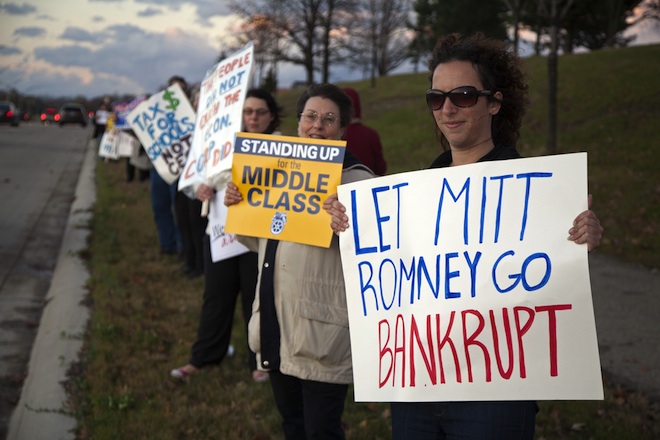We all know how pivotal a role the auto bailout has played in this year’s election. Mitt Romney paid a deceptive tribute to this fact in his wildly deceptive “Jeep” ad that he closed the campaign on. The whole history though is filled with irony. It’s worth remembering just how deeply unpopular the auto bailout was at the time.
Not just unpopular, but also not originated by President Obama, who’s now rightly getting a lot of the credit. The ‘auto-bailout’ wasn’t one thing. It was a series of actions, some fundamental, some stop-gap, over a period of more than six months.
By the time President Obama got handed the situation in early 2009, not just the auto bailout but anything with the name “bailout” was intensely unpopular. It was pretty hard to imagine at the time that it would or could be a key element of his reelection campaign.
But my point here isn’t to make this into some story of Obama heroism. Remember, it started under President Bush. And more importantly I think most Presidents would have done something like what President Obama did. Not exactly. I think a Republican President would have used it as an opportunity to crush the auto unions — something President Obama definitely did not do. But fundamentally the auto rescue was just something that had to be done.
It’s not just a matter of the auto industry having some particular importance in the national economy, which I think it does. In the particular circumstances of the national economic crisis of 2008/09 there was just no way you could let an entire industry with such a dominant foothold in one region — with all the ancillary suppliers and industries that go with it — go under at a moment like that.
I think President Obama deserves a lot of credit. Don’t get me wrong. But I do think that it’s something that most presidents, faced with the situation that existed in 2009, would have had to do something like it. Most presidents though. Not necessarily most people who wanted to be president.
At the time, remember, the whole notion of bailouts was wildly unpopular. Particularly on the Tea Party right, which Romney knew he had to court. So politically, it was an easy call for Romney. And he could have some level of confidence that in the end it would all go badly so he’d be able to say he told you so and portray the whole thing as a costly boondoggle. (It’s worth noting that virtually all Republicans are still portraying the 2009 ‘Stimulus’ bill in the same way, though virtually any economist will tell you that whatever its shortcomings it likely forestalled a new Depression. But that’s another story.)
But that’s not how it turned out. And Romney was left saddled with a position that was not only craven but now deeply politically unpopular — especially in critical battleground states like Ohio, Michigan and Wisconsin.
In that sense Romney’s weather-vane values and mentality were his undoing.






